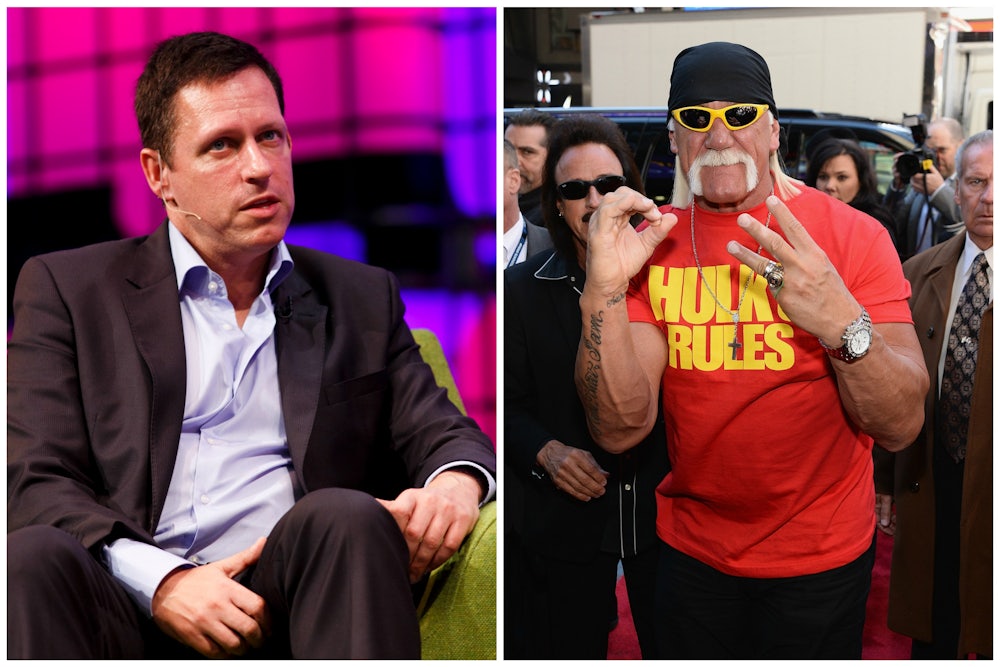Revelations that the Silicon Valley billionaire Peter Thiel has been covertly pursuing a legal campaign to destroy the Gawker Media has generated surprisingly little outrage outside of journalistic circles. Indeed, Thiel has even had defenders like Washington Post legal blogger Eugene Kontorovich, who argued that the billionaire’s behavior was no different than other third-party lawsuits launched by public interest groups like the ACLU and the NAACP. Given the fact that neither the ACLU nor the NAACP ever secretly finance lawsuits in the pursuit of a private vendetta, this seems a ridiculous comparison.
More broadly, Gawker is hard to sympathize with. They initially angered Thiel, he claims, by outing him in 2007. Its flagship site, Gawker.com, is wildly uneven. While they publish much of value, like this 2011 expose of hypocrisy in the Catholic clergy, they also have an undeniable record of publishing scurrilous articles that violate privacy rights, including the Hulk Hogan sex tape.
But Thiel’s Ahab-like mission to destroy it has been even harder to sympathize with. The key problem is that his maximalist and eliminationist goal of inflicting as much damage on Gawker as possible is at odds with an essential civic ideal of the legal system: of trying to reach settlements that balance competing interests.
The Hulk Hogan case is a good example. Terry Bollea, the wrestler’s legal name, is wealthy enough to have pursued the lawsuit by himself, but under normal circumstances would have reached a settlement with Gawker, which offered to do several times. But this wasn’t good enough for Thiel. He wanted not a settlement, but the destruction of Gawker. Theil told The New York Times that “even someone like Terry Bollea who is a millionaire and famous and a successful person didn’t quite have the resources to do this alone.”
In this context, “do this alone” means carrying out a legal search-and-destroy mission. This is why Bollea’s lawyers pursued a legal strategy that denied Gawker the ability to use its insurance money, a tactic hardly in their supposed client’s best interest. The legal strategy being pursued served Thiel’s agenda, rather than its purported goal of seeking redress for Bollea.
Thiel’s explanations for his behavior are puzzling. He told the Times, “It’s less about revenge and more about specific deterrence.... I saw Gawker pioneer a unique and incredibly damaging way of getting attention by bullying people even when there was no connection with the public interest.”
“Deterrence” can only work if the punishment is publicly known, but Thiel pursued his war on Gawker in secret. And if Gawker is indeed “unique,” then who is being deterred by its being destroyed? To say the goal is “less about revenge and more about specific deterrence” is belied by the tactics used, which are all about revenge.
The cant about the “public interest” is refuted by the fact that bankrupting Gawker eliminates any chance of having a solution that balances competing public interests. In this case, there is a conflict between freedom of speech and Bollea’s right to privacy. If Bollea had reached a settlement with Gawker, it would have reflected that balance, punishing Gawker for its violation of Bollea’s privacy but allowing it to continue to exist. But Thiel didn’t want a balanced settlement. He want the total victory of eliminating Gawker from the face of the earth.
Gawker publishes garbage sometimes, but also articles that do serve the public interest, including exposes of Facebook, whose board Thiel serves on. In going after Gawker, Thiel is not, as he presents himself, a philanthropist helping the little guy fight big media, but rather a plutocrat trying to quash voices he doesn’t like to hear. Revenge is neither philanthropy nor justice, and destroying Gawker serves Thiel’s private whims and business goals but not the public interest.
